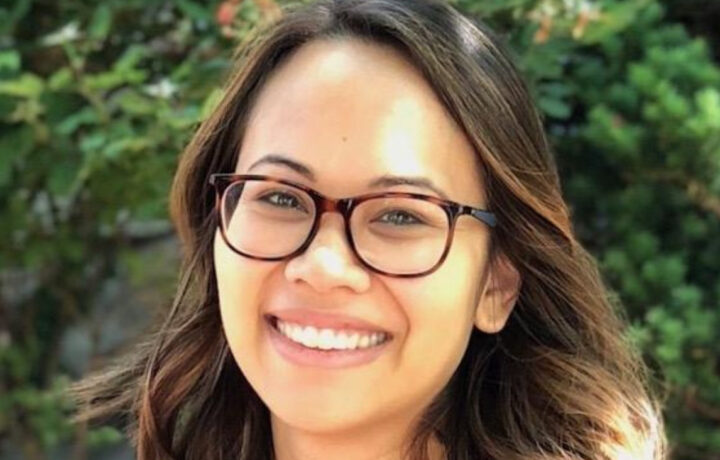One Booz Allen Expert’s Work in Generative Artificial Intelligence
When the team lead for Booz Allen’s cognitive solutions team started her career, she wasn’t a statistician or a computer scientist. But today, Principal Alison Thaung Smith is working in the heart of a highly technical field with generative artificial intelligence (AI), helping Booz Allen and its clients see “the art of the possible” with AI solutions like ChatGPT. Just last month, Alison’s team published a new report, titled “What to Know About ChatGPT and AI’s Future.”
Learn more about Alison’s career path, how she’s found a place to thrive at Booz Allen, and why she believes it’s so important to be visible and speak up—especially for women and people of color.
Seeing Problems from a Different Angle
Alison studied political science and economics in college, before pursuing an M.B.A. Early in her career as a business and financial analyst, her interest in technology began with economic modeling. “I started playing around with technologies and introducing them into my work,” she says.
Her growing interest and expertise led to a position with a consulting firm where she focused on research and evaluation engagements and the pursuit of then-emerging fields like natural language processing (NLP).
“I was able to take the technical and analytical aptitude that I gained from building macroeconomic models and things like that to a separate problem set,” she says. “It was an iterative and incremental learning approach.”
Alison says that learning NLP and other aspects of AI on the job gives her “an almost hacking-type way of approaching a problem.”
“The way I approach problems is probably a little bit less academic or theoretical,” she says. “I think both practical and theoretical perspectives are important, especially when you’re on a team solving really big problems for clients.”
Putting Models into Action
Alison’s cognitive solutions team comes from diverse backgrounds—not only statisticians and computer scientists but also colleagues with liberal arts degrees. Together, they’re carving out a niche in today’s AI ecosystem: fine-tuning AI models and helping organizations integrate AI into their operations—sometimes in unexpected ways.
Take chatbots, for instance. It’s an area where “historically, people roll their eyes,” Alison says. But advances in technology—most notably with the explosion of OpenAI’s ChatGPT large language model late last year—are redefining what’s possible.
She shares one example from her work at Booz Allen. “We have brilliant researchers on our team with a history of working on large language models. They’re exploring ways to use these models to classify what a user wants and improve a chatbot’s contextual awareness.”
“There are so many opportunities popping up left and right related to generative AI, from chatbots to conversational interfaces when interacting with AI systems,” Alison says. “We’re helping clients see the art of the possible.”
Yet as the world sees just how powerful generative AI can be, and as people play around with ChatGPT to generate everything from research summaries to soup recipes, it’s critical to understand the risks and limitations as well.
For example, generative technology is not deterministic. “If two people give the exact same prompt to ChatGPT or another generative algorithm, it might produce different results,” she explains. In addition, “generative AI can make stuff up and say it with extreme confidence. They call these responses hallucinations.” This brings in the need for rigorous fact-checking.
“With any exciting new technology, there are so many different aspects to it and tons of information out there. So, it’s really important to have a complete picture and see it in context,” she says.
Speaking Up and Showing What’s Possible
While highly technical expertise is necessary for any AI solution, Alison says, curiosity and a willingness to learn are far more important for a successful AI career.
To foster both, she recommends attending events like lunch-and-learns and connecting with people in the field, to forge the relationships that organically generate strong ideas. Another piece of guidance: Raise your hand for opportunities like organizing a hackathon, helping a colleague with a technical presentation, or giving a presentation yourself.
Alison admits that she wasn’t comfortable with public speaking at first. But she soon discovered that speaking up at meetings, in front of clients, and in public settings to be part of the job at Booz Allen. Her manager assigned her a presentation—the first of many—just four weeks in.
“I had to put myself in these uncomfortable situations so that I could gain confidence,” she says. “Now public speaking doesn’t even faze me.”
Alison calls public speaking “an underestimated part of really technical jobs” and a vital one. “It’s important to speak often and speak in highly visible situations so that other people have an opportunity to learn a different perspective,” says Alison.
What’s more, being visible and heard encourages people with diverse perspectives to get involved in the field. “It shows other women, and specifically women of color, that we have thoughts and that these thoughts are appreciated,” she says.
Learn more about AI and careers at Booz Allen.
Join us. The world can’t wait.
Explore careers.
SPONSORED CONTENT: This content is written on or behalf of our Sponsor.




